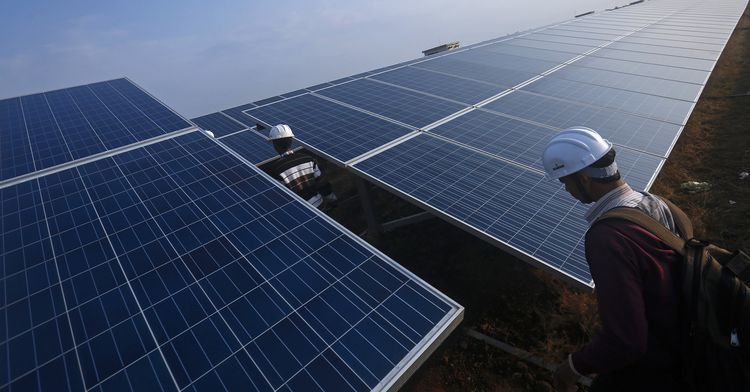
Major companies are investing hundreds of millions of pounds in schemes to cut emissions, from solar panels to overhauling their lorry fleets, it has been announced.
The John Lewis Partnership is phasing out all diesel-powered heavy trucks from its fleet by 2028, and is rolling out more than 500 new delivery lorries powered by 100% renewable biomethane fuel.
Amazon is installing solar panels on depots across the UK which will generate the equivalent electricity required to power 4,500 homes, and has signed a deal to ensure 100% of the power for its UK buildings is from renewables.
And HSBC UK Pensions Scheme has announced it is investing £250 million in solar parks and wind farms around the country, which it said will generate enough clean electricity for the entire population of Oxford.
They are among 30 companies which outlined commitments to tackle climate change and help the environment as part of the Government’s Green GB and NI Week.
They include Lidl and Tesco launching new zero-deforestation soy policies to prevent tropical forests being cut down to grow soy, while EDF Energy plans to electrify its own fleet of 1,500 vehicles by 2030 to cut carbon emissions.
And companies in the low-carbon heating sector, including Engie, Vattenfall, SSE and Metropolitan, are committing more than £320 million investment to boost growth in low-carbon heating schemes for towns and cities.
As it kicked off Green GB Week, the Government claimed jobs in green industries could reach two million by 2030, generating up to £170 billion in exports.
The initiative comes after a UN report said countries must take “unprecedented” action to slash carbon emissions to zero by 2050 and limit global warming to 1.5C above pre-industrial levels.
Energy and clean growth minister Claire Perry said: “Governments cannot confront this unprecedented global challenge alone.
“We need businesses around the world to step up to the mark and today our largest companies are leading the way, making significant pledges worth millions to cut emissions while continuing to grow the green economy.”
Russell Picot, chairman of the Trustee Board, HSBC Bank Pension Trust (UK) Limited, said renewable energy could provide attractive returns for investors seeking predictable cash flows from real assets over the long term.
“The investment characteristics of inflation-linked assets such as these are well suited to provide the income required to meet our long-term pension liabilities,” he said.
Justin Laney, partner and general manager of central transport, John Lewis Partnership, said: “We have been pioneering the adoption of long-distance biomethane trucks in the UK and scaling this up to our entire heavy truck fleet will deliver significant environmental and operational benefits.
“Five biomethane trucks produce the same emissions as one diesel lorry and they are also much quieter, helping reduce not only greenhouse gas emissions and air pollution but also noise pollution in our cities.”
Meanwhile, BT has announced its pledge to become a net zero carbon emissions business by 2045, buying renewable electricity, shifting its fleet to low emissions vehicles and cutting carbon from buildings and operations.
